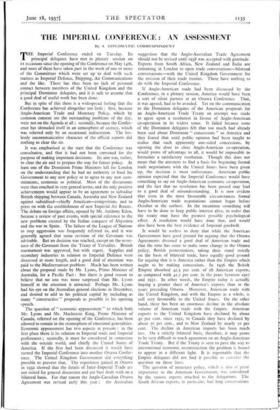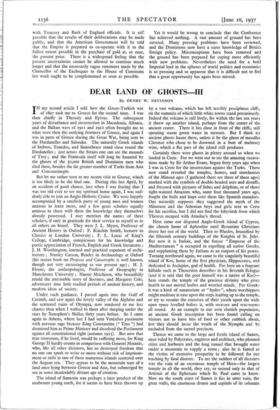THE IMPERIAL CONFERENCE : AN ASSESSMENT
By A DIPLOMATIC CORRESPONDENT
THE Imperial Conference ended on Tuesday. Its principal delegates have met in plenary session on 21 occasions since the opening of the Conference on May 14th, and most of them have taken part in the work of one or more of the Committees which were set up to deal with such matters as Imperial Defence, Shipping, Air Communications and the like. There has thus been no lack of personal contact between members of the United Kingdom and the principal Dominion delegates, and it is safe to assume that a good deal of useful work has been done.
But in spite of this there is a widespread feeling that the Conference has achieved altogether too little : first, because Anglo-American Trade and Monetary Policy, which by common consent are the outstanding problems of the day, were not on the Agenda at all ; secondly, because the Confer- ence has shrouded itself in an atmosphere of secrecy, which was relieved only by an occasional indiscretion. The list- lessly uncommunicative character of the official reports did nothing to clear the air.
It was emphasised at the start that the Conference was consultative, and that it had not been convened for the purpose of making important decisions. Its aim was, rather, to clear the air and to prepare the way for future policy. At least one of the Dominion Prime Ministers left for London on the understanding that he had no authority to bind his Government to any new policy or to agree to any new com- mitments, economic or political. Most of the discussions were thus couched in very general terms, and the only positive achievements would appear to be an agreement to subsidise British shipping between Canada, Australia and New Zealand against subsidised—chiefly American—competition, and to press on with the establishment of new Imperial Air Routes. The debate on foreign affairs, opened by Mr. Anthony Eden, became a review of past events, with special reference to the new problems created by the Italian conquest of Abyssinia and the war in Spain. The failure of the League of Nations to stop aggression was frequently referred to, and it was generally agreed that some revision of the Covenant was advisable. But no decision was reached, except on the sever- ance of the Covenant from the Treaty of Versailles. British rearmament was approved, but with regret. Supplies and secondary industries in relation to Imperial Defence were discussed at some length, and a good deal of attention was paid to the Mediterranean problem. Much has been written about the proposal made by Mr. Lyons, Prime Minister of Australia, for a Pacific Pact : but there is good reason to believe that no one was more surprised than Mr. Lyons himself at the attention it attracted. Perhaps Mr. Lyons had his eye on the Australian general elections in December, and desired to add to his political capital by including as many " constructive " proposals as possible in his opening speech.
The question of " economic appeasement " to which both Mr. Lyons and Mr. Mackenzie King, Prime Minister of Canada, referred on the opening of the Conference, has been allowed to remain in the stratosphere of emotional generalities. Economic appeasement has two aspects at present : in the first place there is its relation to Imperial trade and Imperial preferences ; secondly, it must be considered in connexion with the outside world, and chiefly the United States of America. If the first had been discussed it would have turned the Imperial Conference into another Ottawa Confer- ence. The United Kingdom Government did everything possible to prevent that. The experience gained at Ottawa in 1932 showed that the details of Inter-Imperial Trade are not suited for general discussion and are best dealt with on a bilateral basis. For that reason the Anglo-Canadian Ottawa Agreement was revised early this year ; the Australian suggestion that the Anglo-Australian Trade Agreement should not be revised until 1938 was accepted with gratitude. Experts from South Africa, New Zealand and India are remaining in London to open trade conversations—bilateral conversations—with the United Kingdom Government for the revision of their trade treaties. These have nothing to do with the Imperial Conference.
If Anglo-American trade had been discussed by the Conference, in a plenary session, America would have been a sort of silent partner at an Ottawa Conference. That, it was agreed, had to be avoided. Yet on the communication to the Dominion delegates of the American proposals for an Anglo-American Trade Treaty an attempt was made to agree upon a resolution in favour of Anglo-American co-operation in its widest sense. It failed because some of the Dominion delegates felt that too much had already been said about Dominion " concessions " to America and they feared that until public opinion had been taught to realise that such apparently one-sided concessions, by opening the door to close Anglo-American co-operation, would prove of advantage to all, it would be impossible to formulate a satisfactory resolution. Though this does not mean that the attempts to find a basis for beginning formal trade negotiations with the United States have been given up, the decision is most unfortunate. American public opinion expected that the Imperial Conference would have something to say on Anglo-American economic co-operation, and the fact that no resolution has been passed may lead to a good deal of misunderstanding. It is now evident that even in the most favourable circumstances formal Anglo-American trade negotiations cannot begin before October at the earliest. In the meantime something will have to be done to keep public interest alive, in order that the treaty may have the greatest possible psychological effect. A resolution would have done that, and would also have been the best evidence of Imperial goodwill.
It would be useless to deny that while the American Government have good ground for arguing that the Ottawa Agreements diverted a good deal of American trade and that the time has come to make some change in the Ottawa policy, British protectionists, taking their stand strictly on the basis of bilateral trade, have equally good ground for arguing that it is America rather than the Empire which ought to be making concessions. In 1936 the British Empire absorbed 42.3 per cent. of all American exports, as compared with 41.5 per cent. in the years between 1927 and 1931. In other words, the Empire today is actually buying a greater share of America's exports than in the years preceding Ottawa. Moreover, American trade with the United Kingdom, and with the Empire as a whole, is still very favourable to the United States. On the other hand, there has been an enormous decline in the absolute volume of American trade with the Empire. American exports to the United Kingdom have declined by about 40 per cent. since 1931, to Canada they have declined by about 5o per cent., and to New Zealand by nearly 50 per cent. The decline in American imports has been much less. On a strictly bilateral basis, therefore, it may prove to be very difficult to reach agreement on an Anglo-American Trade Treaty. But if the Treaty is seen to pave the way to international economic reconstruction the problem is bound to appear in a different light. It is regrettable that the Empire delegates did not find it possible to consider the question on those lines.
The question of monetary policy, which is also of great importance to the American Government, was considered by the various experts attached to the delegations. The South African experts, in particular, had long conversations with Treasury and Bank of England officials. It is still possible that the results of their deliberations may be made public, and that the American Government will be told_ that the Empire is prepared to co-operate with it to the` fullest extent possible in the purchase of gold at, or near, the present price. There is a widespread feeling that the present uncertainties cannot be allowed to continue much longer and that the necessarily vague statement made by the Chancellor of the Exchequer to the House of Commons last week ought to be complemented as soon as possible. Yet it would be_ wrong to conclude that the Conference has achieved nothing. A vast amount of ground has been covered. Many pressing problems have been reviewed, and the Dominions now have a surer knowledge of British foreign policy. Misconceptions have been removed and the ground has been prepared for coping more efficiently with new probleins. Nevertheless the need for a bold Imperial lead in the spheres of world politics and economics is so pressing and so apparent that it is difficult not to feel that a great opportunity has again been missed.















































 Previous page
Previous page